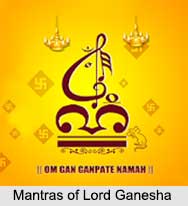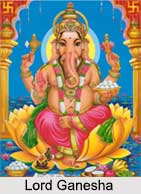 Mantras of Lord Ganesha are infused with the divine power and blessings of the deity. The Ganesha Mantras, also known as "Siddhi Mantras", provide positive and favourable results when they are recited with devotion, faith and adoration. These devotional hymns avert all troubles and helps the worshipper to achieve success. Lord Ganesha is the God of intellect and wisdom and the patron of arts and sciences.
Mantras of Lord Ganesha are infused with the divine power and blessings of the deity. The Ganesha Mantras, also known as "Siddhi Mantras", provide positive and favourable results when they are recited with devotion, faith and adoration. These devotional hymns avert all troubles and helps the worshipper to achieve success. Lord Ganesha is the God of intellect and wisdom and the patron of arts and sciences.
Rules for Reciting Mantras of Lord Ganesha
Before the recital of the Mantras of Lord Ganesha, the devotees have a bath or wash their limbs. Moreover before beginning of the chants, they should do at least three Pranayamas. The least recital of the mantras should be 108 times. When the mantras are recited regularly at a particular time and place for a period of 48 days, then it is considered as an "Upasana" or deep meditation. This results in attainment of spiritual powers or Siddhis.
Various Mantras of Lord Ganesha
One of the most important mantras of Lord Ganesha is;
"Vakratunda Mahaakaaya Suryakotee Sama Prabha; Nirvighnam Kuru Mey Deva, Sarva Kaaryeshu Sarvadaa".
Some of the other important Mantras of Lord Ganesha and their benefits are mentioned below:
Om Shri Ganeshaya Namah: This mantra is generally taught to young children for improvement in their education. This mantra develops their memory and helps them in attaining success in examinations. However, devotees of any age may chant this hymn in order to attain success in education and to positively commencing a new venture.
Om Gan Ganapatye Namah: This mantra is the Beej Mantra of Lord Ganesha. It is from the Ganapati Upanishad. This mantra is mainly utilized for Yoga Sadhana, where a devotee prays to Ganesha and merges self with the supreme peace and knowledge. This can also be used before the beginning of a new venture. The mantra removes obstructions and the worshipper achieves success.
Om Vakratundaya Hum: This mantra is from the Ganesha Purana. When the mind of an individual is filled with negative thoughts, discouragement and depression, the blessing of Lord Ganesha may be achieved by chanting this mantra. This mantra is also used for treatment of spinal problem and curved limbs. This hymn should be recited 1,008 times to heal such problems.
Om Kshipra Prasadaya Namah: This mantra is used when a devotee is in danger or is engulfed with negative energy and there is no way to solve the problem. A devotee of Lord Ganesha may attain quick blessing and peace by recitation of the mantra and with true devotion.
Om Sumukhaya Namah: This mantra purifies a devotee"s soul and spirit. A person can attain inner peace by meditating on this holy mantra.
Om Kapilaya Namah: This hymn denotes that a devotee has the ability to create colours around themselves and others in order to heal them. Kapila means red, which is the colour of one of the avatars of Lord Ganesha.
Om Gajakarnikaya Namah: This mantra depicts that the ears of the elephant God are continuously fanning. A devotee can develop an inner ear with the recitation of this mantra. A person can tune his body with seven chakras and 72,000 nadis. This can give him the ability to be present in any world or Loka and listen to their ancestors and the voices of angels, prophets and even God.
Om Vikataya Namah: When a devotee recites this mantra he can achieve the realization that the world is a drama or a dream.
Om Vighna Nashanaya Namah: This mantra calls upon Ganesha to eliminate every obstacle in the life and works of a devotee. If a person continually meditates of this mantra, all hindrances will be removed from his life.

Om Vinayakaya Namah: Lord Ganesha was known as Vinayaka during the golden age. Thus by chanting this hymn, a devotee will attain a golden age in his life. Vinayaka means the Lord of resolving problems.
Om Ganadhyakshaya Namah: This mantra is a very powerful hymn and helps in group healing. A person can think of a country or a group of loved ones in his mind and then recite this mantra. The simple chant of this mantra will heal the entire group.
Om Bhalachandraya Namah: This mantra helps a devotee to identify himself with Lord Shiva, knowing all the truth and having the feel of carrying the crescent moon, the nectar of peace and the symbol of growth.
Apart from these, there are several other significant Mantras of Lord Ganesha. These are listed as follows:
•Om Vighnarajaya Namaha
•Om Gauripatraya Namaha
•Om Ganesvaraya Namaha
•Om Skandagrajaya Namaha
•Om Avyayaya Namaha
•Om Putaya Namaha
•Om Dakshaya Namaha
•Om Adhyakshaya Namaha
•Om Dvijapriyaya Namaha
•Om Agnigarbhachide Namaha
•Om Indrasripradaya Namaha
•Om Vanipradaya Namaha
•Om Avyayaya Namaha
•Om Sarvasiddhipradaya Namaha
•Om Ekadantaya Namah
•Om Sarvatanayaya Namaha
•Om Sarvaripriyaya Namaha
•Om Sarvatmakaya Namaha
•Om Srushtikatre Namaha
•Om Devaya Namaha
•Om Anekarchitaya Namaha
•Om Lambodaraya Namah
•Om Sivaya Namaha
•Om Suddhaya Namaha
•Om Buddhipriyaya Namaha
•Om Santaya Namaha
•Om Brahmacharine Naamaha
•Om Gajananaya Namaha
•Om Dvaimatreyaya Namaha
•Om Munistutyaya Namaha
•Om Bhaktavighnavinasanaya Namaha
•Om Chaturbahave Namaha
•Om Chaturaya Namaha
•Om Saktisamyutaya Namaha
•Om Lambodaraya Namaha
•Om Surpakarnaya Namaha
•Om Haraye Namaha
•Om Brahmaviduttamaya Namaha
•Om Kalaya Namaha
•Om Grahapataye Namaha
•Om Kamine Namaha
•Om Somasuryagnilochanaya Namaha
•Om Pasankusadharaya Namaha
•Om Chandaya Namaha
•Om Gunatitaya Namaha
•Om Niranjanaya Namaha
•Om Akalmashaya Namaha
•Om Svayamsiddhaya Namaha
•Om Siddharchitapadambujaya Namaha
•Om Bijapuraphalasaktaya Namaha
•Om Varadaya Namaha
•Om Sasvataya Namaha
•Om Krutine Namaha
•Om Dvijapriyaya Namaha
•Om Vitabhayaya Namaha
•Om Gadine Namaha
•Om Chakrine Namaha
•Om Ikshuchapadhrite Namaha
•Om Sridaya Namaha
•Om Ajaya Namaha
•Om Utpalakaraya Namaha
•Om Sripataye Namaha
•Om Stutiharshitaya Namaha
•Om Kuladribhettre Namaha
•Om Jatilaya Namaha
•Om Kalikalmashanasanaya Namaha
•Om Chandrachudamanaye Namaha
•Om Kantaya Namaha
•Om Papaharine Namaha
•Om Samahitaya Namaha
•Om Asritaya Namaha
•Om Srikaraya Namaha
•Om Saumyaya Namaha
•Om Bhaktavanchitadayakaya Namaha
•Om Santaya Namaha
•Om Kaivalyasukhadaya Namaha
•Om Sachidanandavigrahaya Namaha
•Om Jnanine Namaha
•Om Dayayutaya Namaha
•Om Dantaya Namaha
•Om Brahmadveshavivarjitaya Namaha
•Om Pramattadaityabhayadaya Namaha
•Om Srikanthaya Namaha
•Om Vibhudesvaraya Namaha
•Om Ramarchitaya Namaha
•Om Vidhaye Namaha
•Om Nagarajayajnopavitavate Namaha
•Om Sthulakanthaya Namaha
•Om Svayamkartre Namaha
•Om Samaghoshapriyaya Namaha
•Om Parasmai Namaha
•Om Sthulatundaya Namaha
•Om Agranye Namaha
•Om Dhiraya Namaha
•Om Vagisaya Namaha
•Om Siddhidayakaya Namaha
•Om Durvabilvapriyaya Namaha
•Om Avyaktamurtaye Namaha
•Om Adbhutamurtimate Namaha
•Om Sailendratanujotsanga Khelanotsukamanasaya Namaha
•Om Svalavanyasudhasarajita Manmathavigrahaya Namaha
•Om Samastajagadadharaya Namaha
•Om Mayine Namaha
•Om Mushikavahanaya Namaha
•Om Hrushtaya Namaha
•Om Tushtaya Namaha
•Om Prasannatmane Namaha
•Om Sarvassiddhipradayakaya Namaha




















